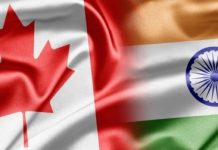 DEEPAK Obhrai, Parliamentary Secretary to the Minister of Foreign Affairs and for International Human Rights, on Friday noted that Canada has the knowledge and expertise to provide India with world-class energy-related goods and services.
DEEPAK Obhrai, Parliamentary Secretary to the Minister of Foreign Affairs and for International Human Rights, on Friday noted that Canada has the knowledge and expertise to provide India with world-class energy-related goods and services.
Obhrai was delivering the keynote address at the India-Canada Energy Forum co-hosted by the Alberta School of Business, Canada-India Business Council, and the Petrotech Society in Calgary.
Here is Obhrai’s address:
Canada’s long-standing friendship with India is built on the shared values of democracy, pluralism, federalism and respect for human rights. It is also based on strong interpersonal connections—the result of an Indian diaspora of more than 1.2 million in Canada. Trade relations add a further dimension to our collaborative partnership, with bilateral trade and investment steadily growing since 2006. Just last year, our bilateral trade surpassed $5.8 billion. This represents a 12 per cent increase over 2012 and almost a 40 per cent increase since 2010.
Energy is a predominant driver of social and economic growth. We rely on predictable energy supplies to pave the road to prosperity. Canada and India have a clear understanding of the energy paradigm, and have reached agreement on many occasions to partner in the energy sector.
This energy partnership was exemplified at the highest level last October, with the inaugural session of the Ministerial Energy Dialogue, chaired by then Natural Resources Canada Minister Joe Oliver and then Deputy Chairman of India’s Planning Commission Montek Singh Ahluwalia.
The Energy Dialogue is a commitment agreed to during Prime Harper’s visit to India in November 2012. It was clear from this meeting that there is much to gain from the bilateral energy relationship. Terms of Reference were signed, promoting two-way trade in petroleum and natural gas, and signaling a concrete intention to cooperate across a range of energy issues, including renewable and green energy technology and in the power sector. Canada looks forward to the next meeting, to advance collaboration in this regard.
In a world in constant transformation, and growingly dependent on reliable sources of energy, Canada has become a recognized partner for many countries in the energy sector, from fuel supply to the delivery of products and services. As India’s middle class’ demand for consumer goods grows, as the country develops plans for electrification and power supply, and seeks to reduce energy gaps, Canada can increasingly support India in responding to its energy needs, in areas spanning from oil and gas and nuclear to hydro, solar and wind energy.
The Department of Foreign Affairs, Trade and Development has announced Canada’s Global Markets Action Plan, or GMAP. Demonstrating Canada’s strengths in energy, oil and gas has been set a target sector in the GMAP. This Action Plan represents Canada’s new blueprint for creating jobs and opportunities for Canadians through trade.
India is a priority emerging market for Canada and oil and gas has been identified as a GMAP priority sector for trade development with India. Certainly, not only can Canada supply crude oil and liquefied natural gas to India, it can also, with proven expertise and capabilities, assist in developing energy-related infrastructure in the country.
Currently, India is both the world’s fourth largest oil consumer and oil importer. In 2012, oil imports by India represented 73% of India’s oil demand, and this reliance on foreign oil is expected to increase to 93% by 2035. Looking to diversify its energy supplies from its traditional partners in the Middle East, India has initiated importing oil and gas from Canada. With major hydrocarbons transportation infrastructure projects being explored throughout Canada, constant and reliable fuel supply to India is becoming increasingly tangible.
As Canada and India signed a Memorandum of Understanding regarding petroleum and natural gas cooperation during the inaugural meeting of the Ministerial Energy Dialogue in October 2013, the table is set to expand trade and collaboration in the sector. Outlining the importance of this industry for the Canada-India relation, then Natural Resources Canada Minister Joe Oliver raised Canada’s profile as a long-term strategic partner across natural resource sectors, particularly energy, during a mission to India in January 2014. Then Alberta Premier Alison Redford also visited India in last January, and joint events demonstrated Canada interest to collaborate with India on energy issues, including oil and gas.
As mentioned earlier, Canada has the knowledge and expertise to provide India with world-class energy-related goods and services. In addition to oil and gas, the nuclear segment is of interest to both Canada and India. The September 2013 entry-into-force of the Nuclear Cooperation Agreement between our two countries opens the door to uranium exports to India, as well as the provision of services in the sector.
Sharing a similar nuclear technology, there is a clear fit for cooperation in the civil nuclear sector. Our two countries’ supply chains have natural synergies that position them to form collaborations to meet India’s civil nuclear targets.
India has benefitted from Canadian hydroelectric expertise for six decades. Collaboration in power, including the knowledge sharing and information exchange on the legislative and regulatory frameworks in both countries, with as an example Canada’s experience with trans-border transactions with the US, will profit India as it plans to implement its plan for “24/7 power for all”.
This spring, the largest election in human history has resulted in a clear majority government led by Prime Minister [Narendra] Modi, reflecting people of India’s desire and expectations for change and further improvement.
To initiate engagement with the new government, Citizenship and Immigration Canada Minister Alexander visited India last week and met recently appointed Indian Cabinet Ministers. Further senior level visits and dialogues are planned in the coming months.
I had the pleasure of accompanying Governor General His Excellency David Johnston to India this year when the complementarity of our two economies and related win-win opportunities, including in energy, were highlighted.
The bilateral dialogue at senior levels is strong and bound to get stronger. Canada is not only a source of a wide variety of energy types but has also designed high technologies applied successfully to natural resources and also available to help India continue modernizing.
A priority area for Canada’s valued relationship with India, as well as a priority for the Indian government requiring the development of frontier and unconventional resources, I expect energy security will become a defining element of the Canada-India relationship. Canada looks forward to further collaboration with India in this sector.












